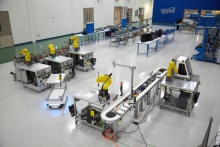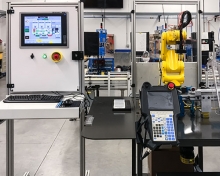Smart Manufacturing: Revolutionizing Industries

A Deep Dive into Smart Manufacturing
In today's fast-paced and ever-evolving world, the concept of manufacturing is undergoing a remarkable transformation. Enter the era of "Smart Manufacturing," a paradigm shift that promises to revolutionize industries and redefine the way products are made. This blog delves into smart manufacturing; exploring its key principles, technologies, and the profound impact it has on various sectors.
What Is Smart Manufacturing?
Smart manufacturing, also known as Industry 4.0 or the Fourth Industrial Revolution, represents the convergence of cutting-edge technologies with traditional manufacturing processes. It harnesses the power of data, automation, and connectivity to create more efficient, flexible, and responsive production systems.
Key Principles of Smart Manufacturing
- Data-Driven Decision-Making: At the core of smart manufacturing is data. Sensors and IoT devices collect real-time data from machines, processes, and products. Advanced analytics and AI algorithms turn this data into actionable insights, enabling proactive decision-making and predictive maintenance.
- Interconnected Ecosystem: Smart manufacturing relies on the Industrial Internet of Things (IIoT), where machines, devices, and systems communicate seamlessly. This interconnected ecosystem allows for real-time monitoring and control of the entire production chain.
- Automation and Robotics: Automation is a cornerstone of smart manufacturing. Robots and autonomous systems handle repetitive and dangerous tasks, enhancing efficiency, precision, and safety in the manufacturing process.
- Additive Manufacturing (3D Printing): 3D printing technology has found its place in smart manufacturing. It enables rapid prototyping, customization, and the production of complex geometries, reducing waste and lead times.
- Digital Twins: Digital twin technology creates virtual replicas of physical assets, allowing for simulations and testing in a risk-free environment. This aids in product development, process optimization, and troubleshooting.
The Impact of Smart Manufacturing
- Improved Efficiency: Smart manufacturing optimizes production processes, minimizes downtime, and reduces waste, leading to significant improvements in operational efficiency.
- Enhanced Quality: Real-time monitoring and control ensure consistent product quality, reducing defects and minimizing the need for rework.
- Flexibility and Customization: Smart manufacturing enables the rapid reconfiguration of production lines to accommodate changes in demand and customization requirements.
- Sustainability: By optimizing resource usage and reducing waste, smart manufacturing contributes to a more sustainable and environmentally friendly production process.
- Competitive Advantage: Companies embracing smart manufacturing gain a competitive edge by responding faster to market changes and delivering high-quality products more efficiently.
Industries Embracing Smart Manufacturing
Smart manufacturing is not limited to a single industry; it's reshaping various sectors, including automotive, aerospace, pharmaceuticals, electronics, and more. Each industry adapts smart manufacturing principles to its unique needs and challenges.
The Future of Manufacturing
As we look ahead, the trajectory of smart manufacturing is clear: it will continue to evolve and expand its reach. New technologies such as 5G connectivity, edge computing, and quantum computing will further enhance its capabilities. The factories of the future will be more intelligent, efficient, and sustainable than ever before.
In conclusion, smart manufacturing is more than a buzzword; it's a transformative force that is reshaping the manufacturing landscape. Embracing these technological advancements is not just an option but a necessity for companies aiming to stay competitive in an increasingly dynamic global market. The future of manufacturing is smart, and it promises a world of innovation, efficiency, and endless possibilities.






